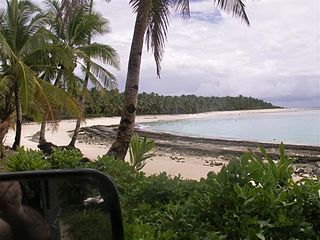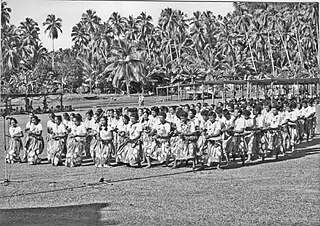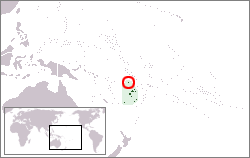
Fiji has held 10 general elections for the House of Representatives since becoming independent of the United Kingdom in 1970; there had been numerous elections under colonial rule, but only one with universal suffrage. In this period, Fiji has had three constitutions, and the voting system has changed accordingly. Note that there are no general elections for the Senate: The 32 Senators are nominated, not elected.
Fijians are a nation and ethnic group native to Fiji, who speak Fijian and share a common history and culture.

Fiji is divided administratively into four divisions, which are further subdivided into fourteen provinces; the self-governing island of Rotuma and its dependencies lie outside any of the four divisions. Each division is headed by a Commissioner, appointed by the Fijian government. The divisions are basically agglomerations of provinces and have few administrative functions of their own, but serve to foster cooperation among the member provinces for providing services. Each province has a provincial council which may make bylaws and impose rates, subject to the approval of the Fijian Affairs Board, a government department. The board must also approve the appointment of the Roko Tui, or executive head of the provincial council, who is usually a high chief, although in recent years, commoners have sometimes been chosen.
The Council of Rotuma is a municipal body on the island of Rotuma, a Fijian dependency. Owing to the unique character of Rotuma, the powers of this council are greater than those of other municipal bodies in Fiji and in some ways it approximates a legislative body, though it is in every way subordinate to the Parliament of Fiji.
Rotuman, also referred to as Rotunan, Rutuman or Fäeag Rotuma, is an Austronesian language spoken by the indigenous people of the South Pacific island group of Rotuma, an island with a Polynesian-influenced culture that was incorporated as a dependency into the Colony of Fiji in 1881. Classification of Rotuman is difficult due to the large number of loan words from Samoan and Tongan, as a result of much cultural exchange over the history of the Pacific. Linguist Andrew Pawley groups the language with the West Fijian languages in a West Fijian – Rotuman branch of the Central Pacific sub-group of Oceanic languages.
Solkope is a small and densely wooded island off the southern coast of Rotuma in the Fiji Islands, at the edge of the fringing coral reef. It is separated from the main island of Rotuma by a channel that is between 50 and 200 m wide, and lies immediately southeast of the village of Kalvaka in the district of Noa'tau. It 765 m long east-west, and up to 515 m wide, and rises to a height of 128 m. Its area is 0.3 km². From the sea, it cannot be recognised as a separate island.
The Rotuma Group is a group of volcanic islands with Rotuma Island being the main island, located at 12°35′S177°10′E, approximately 465 km north of Fiji.

Motusa is a group of close villages in the district of Itu'tiu, on the island of Rotuma, one of the islands of Fiji. Rotuma is made up of two volcanic landmasses connected by a sandy isthmus, on which Motusa is located.

Dance in Rotuma refers to the traditional and modern dance styles performed by the people of the island of Rotuma, which became a dependency of Fiji in 1881. Despite Rotuma's political and historical links with Fiji, the island's culture shows strong Polynesian influences, particularly from Samoa and Tonga, which, along with Fiji, feature strongly in the history and traditions of the Rotuman people.
Gagaja[ŋaŋatʃa] is a Rotuman word denoting the position of "Chief" or "Lord". This could be a formal chiefly position in one of the seven districts or a village chief as well as to anyone else, such as the Chairman of the Rotuma Island Council to whom respect and deference is owed based on their own skills and attributes. Unlike in many other Pacific cultures, the official chiefly positions are not allocated according to any strict primogeniture, but rather are elected from all eligible males within certain kạinaga to whom the chiefly title belongs.
The Fakpure was the secular ruler of Rotuma in the pre-European contact times. It was one of three chiefly roles with direct influence across the island of Rotuma, the other two being the Mua and the Sau. Traditionally the most senior political authority on the island, the Fakpure was one of the gagaj ‘es itu’u of the districts of Rotuma, and the convener of the island’s Council of Chiefs. After being elected as the district chief through the traditional processes, the position of fakpure was bestowed on the most senior of these district chiefs, usually the chief whose district had won the most recent war, who also received the privilege of being the first served in the politically charged kava ceremony.

Noa'tau is one of the seven districts on the island of Rotuma, a dependency of Fiji. It includes the villages of Kalvaka ‘Ut’utu Matuea Maragteu Fafaisina and Fekeoko.
Tēfui are the unique garlands of the Pacific Island, Rotuma. They are made by tying multiple "fui", with modern adaptations using wool or ribbon. The number of fui used is dependent on the situation. The Rotuman tēfui is used primarily as part of traditional ceremonies and celebrations (kato'aga), both happy and sad.
The Rotumans are the indigenous inhabitants of Rotuma, a small island group forming part of the Republic of Fiji. The island itself is a cultural melting pot at the crossroads of the Micronesian, Melanesian and Polynesian divisions of the Pacific Ocean, and due to the seafaring nature of traditional Pacific cultures, the indigenous Rotuman have adopted or share many aspects of its multifaceted culture with its Melanesian, Micronesian and Polynesian neighbours.

Severe Tropical Cyclone Daman was the strongest cyclone of the 2007–08 South Pacific cyclone season. Cyclone Daman was the fourth tropical depression and the first severe tropical cyclone to form east of longitude 180° during the 2007–08 South Pacific cyclone season. Due to the severity of the storm, the name Daman was retired and replaced with Denia.

Uea is a high rocky offshore island of Rotuma. Uea is one of a number of outliers lying off the west coast of Rotuma. It is the second largest island and is the highest island in the Rotuma Group with an elevation of 260 metres (850 ft).

Malhaha is one of the seven districts on the island of Rotuma, a dependency of Fiji. It includes the villages of Pepheua, Else'e, and Elsio. It is here that Raho, the founder of Rotuma, established his residence.
The mua was one of three chiefly roles with direct influence across the island of Rotuma, the other two being the Fakpure and the Sau. The mua was referred as the head priest of the island who presided over rituals and prayers.
Ngaire Fuata is a New Zealand Television producer for TVNZ and a former Pop singer. She is of Rotuman and Dutch descent.







